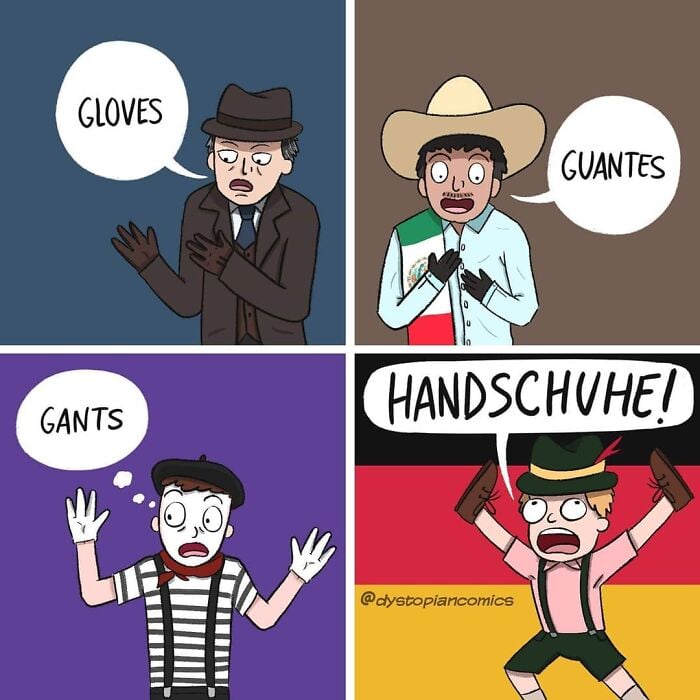Me when languages from different groups have different words for an object
Comic Strips
Comic Strips is a community for those who love comic stories.
The rules are simple:
- The post can be a single image, an image gallery, or a link to a specific comic hosted on another site (the author's website, for instance).
- The comic must be a complete story.
- If it is an external link, it must be to a specific story, not to the root of the site.
- You may post comics from others or your own.
- If you are posting a comic of your own, a maximum of one per week is allowed (I know, your comics are great, but this rule helps avoid spam).
- The comic can be in any language, but if it's not in English, OP must include an English translation in the post's 'body' field (note: you don't need to select a specific language when posting a comic).
- Politeness.
- Adult content is not allowed. This community aims to be fun for people of all ages.
Web of links
- [email protected]: "I use Arch btw"
- [email protected]: memes (you don't say!)
Handshoes
bless you
Get soon tight.
Dank ahh
Actually, English is a Germanic language. However, you are right that this specific word in English is not Germanic.
Most words in English aren't.
Those damn French.
English is a chimera that ate the faces of 3 other languages and wears their skins
Handskar, I stand with the Germans on this one
I know it's not likely, but I REALLY like the idea of "handcar"
It's not exactly handcar, but "vehicle" in german is "drivething" (Fahrzeug).
I love how they jam words together to make new words. As I understand it, German is easier to learn because the bigger words are made of smaller words glued together instead of creating new words with no clues. I got this from a book on the history of the English language, which I will again promote because it was so fun to read:
Plane is Fly Thing (Flugzeug)
You know, I know just enough German to have wondered how -zeug fit into things and now I know and I'm pretty happy about drive and fly things 😂
Are you also happy about play things (toys), fire things (lighters), hit things (drums), work things (tools) and green things (greenery)?
What's so special about it? https://thumbs.dreamstime.com/z/old-railway-handcar-railroad-mokra-gora-serbia-old-railway-handcar-186122041.jpg
Okay well yes when you point out the obvious and valid English word handcar I see how this is a dumb comment haha
See I'd much prefer one woth pedals, like a bike.
I don't think it would be very practical. It's so heavy you have to use your entire body weight to get it going.
I didn't realize I've been saying "hand shoes" all my life. Finnish word hanskat obviously comes from Swedish handskar. Maybe I should say käsineet instead so it would have nothing to do with shoes.
Har undrat vad "skar" betyder i ordet. Hand är ju självklart men inte hittat något om vad skar menar eller brukade mena.
If it weren't for all that Latin and French influence, we'd still be calling them handshoes, too.
Once you can wrap your head around Handshuhe, Fingerhut becomes obvious. "Ah, so this is how this is going to go."
Following that logic then how about Penis-Regenmantel?
Japanese: 手袋 = Tebukuro = Hand bag/sack
mittens should be handbags
handbags should be, uh, just bags?
Handbags are just bags in Japanese, but a different bag word: 鞄 (kaban)
Eskularruak.
I prefer to call my gloves handfurs thankyouverymuch
To handle furries better, smart, I just use work gloves tho.
I mean, the German has a point
But why not Handsocken?
Glove: From Middle English glove, glofe, from Old English glōf, *glōfe, *glōfa, ("glove"; weak forms attested only in plural form glōfan (“gloves”)), from Proto-Germanic *galōfô (“glove”), from Proto-Germanic *ga- (“collective and associative prefix”) + Proto-Germanic *lōfô (“flat of the hand, palm”)
Enjoy your palmsies
It's almost like they have different root languages
4 Germans downvoted with their handtoes
In Japanese, gloves is "tebukuro", 手袋, where 手 ("te") means hand, and 袋 ("fukuro") means sack.
Handschuhe literally translates into "hand shoes" so it’s the only one that makes any sense.
I also learned today that a German word for accordion is Handharmonika, and I love it so much.
It seems to be Ziehharmonika, acc to Google Translate.
I think there are multiple words (like Akkordion), but it may be a brand name?

Pull harmonica
What not being conquered by the Romans does to a language.
Welsh is another good example
Well, in English, “glove” is made up of two parts: g + love. The G is for your homies, and the love part is holding hands with your homies, and that’s what wearing a glove feels like.
Don’t fact-check me. >.>
Can appreciate the french mime not speaking it.
Then a wild перчатки (perchatki) appeared.
